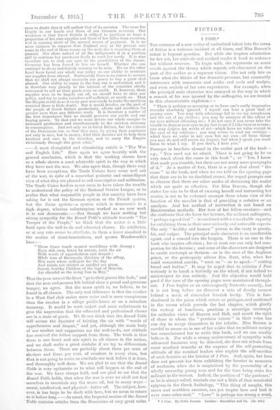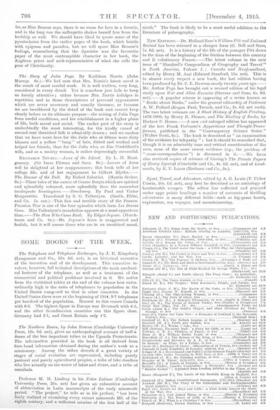FICTION.
I POSE.* THE entrance of a new writer of undoubted talent into the arena of fiction is a welcome incident at all times, and Miss Benson's talent is beyond question. But while she inspires admiration for her wit, her attitude and method render it hard to welcome her without reserves. To begin with, she represents an acute revolt against the theory which regards self-effacement on the part of the author as a supreme virtue. She not only lets us know what she thinks of her dramatis personae, but constantly intervenes with comments and asides and ncds and nudges,
and even recitals of her own experiences. For example, when the principal male character was annoyed at the way in which a remark of his was ignored by the suffragette, we are treated to this characteristic explosion :- " There is nothing so annoying as to have ono's really impressive remarks absolutely ignored. I myself can bear a great deal of passing over. You may with advantage fail to see my complexion and the cut of my clothes ; you may be unaware of the colour of my eyes without offending me ; I do not care if you never take the trouble to depress your eyes to my foot to see if I take twos or sevens ; you may despise my works of art—which have no value except in the eyes of my relations ; you may refuse to read my writings— which have no value in any eyes but my own—all these things you may do and still retain my respect, but when I speak you must listen to what I say. If you don t, 1 hate you."
Passages in brackets abound in the earlier part of the book- e.g., " You need not be afraid. There is not going to ho so very much shout the cause in this book " ; or " Yes, I know that made you tremble, but there are not many more paragraphs of it." As a matter of fact, there is a good deal about " the cause " in the book, and when we are told on the opening page that there are to be no deathbed scenes, the sequel prompts ono to observe that there are other modes of distressing the reader which are quite as effective. For Miss Benson, though she states her aim to be that of amusing herself and instructing her reader, is not to be reckoned amongst those whose view of the function of the novelist is that of providing a sedative or an anodyne. And her method of instruction is not based on Montessorian methods. Her love of her fellow-creatures—and she confesses that she loves her heroine, the militant suffragette, " perhaps a good deal "—is combined with a remarkable capacity for exhibiting them in their most unlovely and unlovable aspects. Tho only " healthy and human " person in the story is greedy, fat, and vulgar. The principal male character is an insufferable egoist, and a coward into the bargain. There is no one in the book who inspires affection ; for at most one can only feel com- passion for the heroine ; and some of the characters are designed to excite contempt or derision—as in the case of the Anglican priest, or the grotesquely odious Mrs. Rust, who, when her
maid committed suicide, " went on "—so to speak—" cutting bread and butter." It may be urged that to criticize I P088 seriously is to break a butterfly on the wheel, if not indeed to misinterpret its aim entirely. And the objection would hold
good if the tone of the opening pages were maintained through- out. I Pose begins as an extravagantly fantastic comedy, but it is not long before we discover a vein of deadly earnest behind a mask of somewhat feverish levity. This is fore- shadowed in the poem which serves as prologue, and confirmed in the versos which precede the last chapter, which glorify the ecstasy of loneliness, proclaim a sovereign contempt for orthodox views of Heaven and Hell, and assort the right of those in whom the " precious venom " in their veins has run dry to merge themselves in the infinite. Miss Benson is careful to assure us in one of her asides that no militant society lies commissioned her to write this book, and we can readily believe it. For while a strong undercurrent of sympathy with advanced feminism may be detected, she does not refrain from some mordant remarks at the expense of the self-protecting attitude of the nominal leaders who exploit the self-sacrifice of such fanatics as the heroine of I Pose. And, again, her love does not prevent her from exhibiting the heroine in moments of weakness, when she is magnetized by the personality of a wholly unworthy young man and for the time being sinks the militant in the woman. Indeed, the position of " the gardener," as ho is always called, reminds one not a little of that wonderful epigram in the Greek Anthology, " This thing of naught, this mean and worthless creature, can yet inspire love and lord it over some other soul." " Love" is perhaps too strong a word,
• I Poao. By Stella Boom Loudon : Macmillan and Co. (5s. nct.l for, as Miss Benson says, there is no room for love in a fanatic, and in the long run the suffragette shakes herself free from the lordship as well. We should have liked to quote some of the pyrotechnics from the earlier pages of the book, which bristle with epigram and paradox, but we will spare Miss Benson's feelings, remembering that the Spectator was the favourite paper of the most contemptible character in her book, the Anglican priest and arch-representative of what she calls the pose of Christianity.





















































 Previous page
Previous page